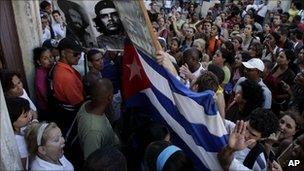Barack Obama urges release of Cuban dissidents
- Published

Pro- and anti-government protesters clashed in Havana on the anniversary of Mr Zapata's death
US President Barack Obama has urged the immediate and unconditional release of all jailed dissidents in Cuba.
The president made the call on the first anniversary of the death on hunger strike of Cuban opposition leader Orlando Zapata Tamayo.
President Obama said his death had drawn the world's attention to "the ongoing mistreatment of those unjustly held by Cuban authorities".
So far, there has been no reaction from the Cuban authorities.
President Obama said the United States stood by the dissidents.
"The Cuban people must know that their suffering does not go unnoticed and that the United States remains unwavering in our commitment to defend the inalienable right of the Cuban people to enjoy the freedoms that define the Americas and that are universal to all human beings," he wrote in a White House statement.
'Unfulfilled dreams'
President Obama also denounced the Cuban government for what he said was its harassment of Mr Zapata's mother.
He said the detention of "Reina Luisa Tamayo and others across Cuba, as they sought to commemorate her son's death, underscores how much of his dream remains unfulfilled".
Human rights groups in Cuba say at least 46 opposition leaders, including Mr Zapata's mother, were detained on Wednesday to prevent them from commemorating his death.
Mr Zapata died on 23 February 2010 after 85 days on hunger strike. He was the first Cuban activist to starve himself to death in protest in nearly 40 years, and his death drew international condemnation.
Since his death, the Catholic Church in Cuba brokered a deal with the Cuban authorities to free more than fifty dissidents.
Forty of those released accepted exile in Spain. The other 12 refused to leave Cuba and have stayed on the island.
The Cuban government, which regards dissidents as criminals disloyal to the communist state, has not given any indication whether it plans to free more of the dissidents who are still in jail.